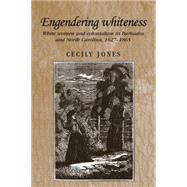Engendering whiteness White women and colonialism in Barbados and North Carolina, 1627-1865
, by Jones, Cecily- ISBN: 9780719064333 | 0719064333
- Cover: Paperback
- Copyright: 6/30/2014
Engendering Whiteness represents a comparative analysis of the complex interweaving of race, gender, social class and sexuality in defining the contours of white women's lives in Barbados and North Carolina during the era of slavery. Despite their gendered subordination, their social location within the dominant white group afforded all white women a range of privileges. Hence, their whiteness, as much as their gender, shaped these women's social identities and material realities. Crucially, as the biological reproducers of whiteness, and hence the symbolic and literal embodiment and bearers of the state of freedom, they were critical to the maintenance and reproduction of the cultural boundaries of 'whiteness', and consequently the subjects of patriarchal measures to limit and control their social and sexual freedoms.
Engendering Whiteness draws on a wide variety of sources including property deeds, wills and court transcripts, and interrogates the ways in which white women could be simultaneously socially positioned within plantation societies as both agents and as victims. It also reveals the strategies deployed by elite and poor white women in these societies to resist their gendered subordination, to challenge the ideological and social constraints that sought to restrict their lives to the private domestic sphere, to protect the limited rights afforded to them, to secure independent livelihoods, and to create meaningful existences.
A fascinating study that will be welcomed by historians of imperialism as well as scholars of gender history and women's studies.
Engendering Whiteness draws on a wide variety of sources including property deeds, wills and court transcripts, and interrogates the ways in which white women could be simultaneously socially positioned within plantation societies as both agents and as victims. It also reveals the strategies deployed by elite and poor white women in these societies to resist their gendered subordination, to challenge the ideological and social constraints that sought to restrict their lives to the private domestic sphere, to protect the limited rights afforded to them, to secure independent livelihoods, and to create meaningful existences.
A fascinating study that will be welcomed by historians of imperialism as well as scholars of gender history and women's studies.






